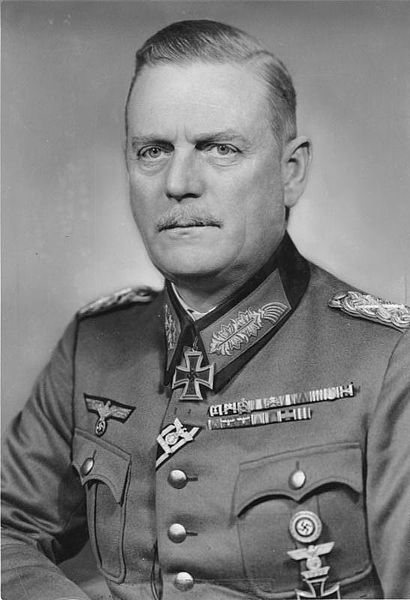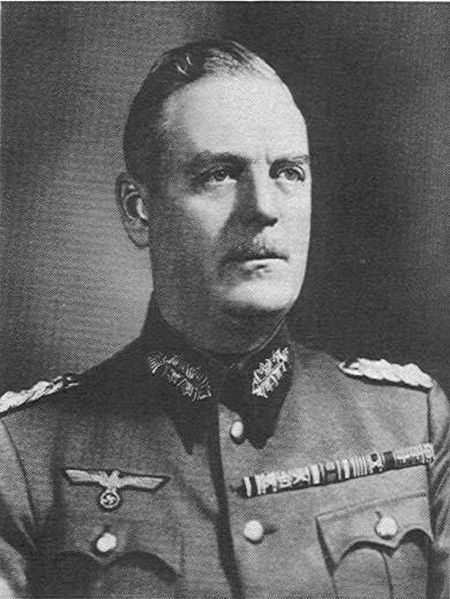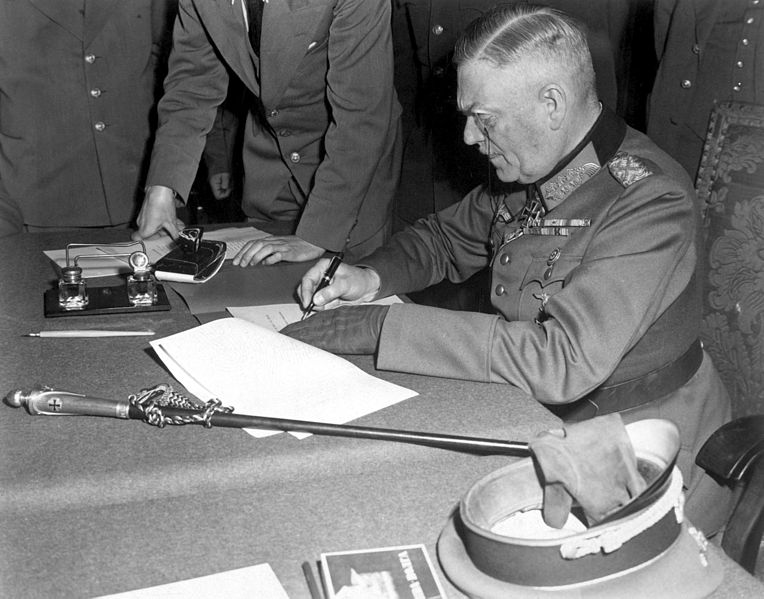<Back to Index>
- Field Marshal of the Wehrmacht Wilhelm Bodewin Johann Gustav Keitel, 1882
PAGE SPONSOR


Wilhelm Bodewin Johann Gustav Keitel (22 September 1882 - 16 October 1946) was a German field marshal (Generalfeldmarschall). As head of the Oberkommando der Wehrmacht (Supreme Command of the Armed Forces) and de facto war minister under Adolf Hitler, he was one of Germany's most senior military leaders during World War II. At the Allied court at Nuremberg he was tried, sentenced to death and hanged as a war criminal.
Keitel was born in Bad Gandersheim, Duchy of Brunswick, German Empire, the son of Carl Keitel, a middle class landowner and his wife Apollonia Vissering. After completing his education in Göttingen, he embarked on a military career in 1901, becoming a Fahnenjunker (Cadet Officer), joining the 6th Lower - Saxon Field Artillery Regiment. He married Lisa Fontaine, a wealthy landowner's daughter, in 1909. Together they had six children, one of whom died in infancy. His eldest son, Karl - Heinz Keitel went on to serve as a divisional commander in the Waffen - SS. During World War I Keitel served on the Western Front with Field Artillery Regiment No. 46. In September 1914, during the fighting in Flanders, he was severely wounded in his right forearm by a shell fragment. Keitel recovered, and thereafter was posted to the German General Staff in early 1915. After World War I ended, he stayed in the newly created Reichswehr, and played a part in organizing Freikorps frontier guard units on the Polish border. Keitel also served as a divisional general staff officer, and later taught at the Hanover Cavalry School for two years.
In late 1924, Keitel was transferred to the Ministry of Defence (Reichswehrministerium), serving with the Troop Office (Truppenamt), the post Versailles disguised General Staff. He was soon promoted to the head of the organizational department, a post he retained after the Nazi seizure of power in 1933. He suffered a heart attack and double pneumonia in the autumn of 1932. In 1935, based on a recommendation by Werner von Fritsch, Keitel was promoted to major general and appointed as the departmental head of the Wehrmachtsamt (Armed Forces Office) which had the responsibility over all three branches of the armed forces.
His youngest son, Hans - Georg Keitel, was severely
wounded in the thigh during the 1940 campaign in France.
He died on 18 July 1941 in a field hospital after being
mortally wounded the day before by a Russian aircraft
attack. Hans was buried in the family plot in Bad
Gandersheim. His father's ashes (supposedly scattered
after being hanged) were purchased from the Americans and
are buried with him and his uncle Bodewin Keitel at the
family plot in Bad Gandersheim. Another son, Major Ernst -
Wilhelm Keitel, was captured by the Russians at the end of
World War II. He survived his captivity, was released in
January 1956 and returned home to Germany.
Keitel's brother, General Bodewin Keitel,
an infantry general in the Army High Command (OKH), was
captured by Allied forces in 1945 and released in 1947. On
the day of the 20 July 1944 plot to kill Adolf Hitler,
Bodewin Keitel was on an inspection tour in his command
area in Danzig, when his command post inadvertently
received a telex from a citizen of Berlin addressed to his
first officer, Hasso von Boehmer from the co-conspirator's
headquarters in the Bendlerblock, arranging the first
steps to then be taken by participant Boehmer. When Keitel
then heard a radio broadcast about the failed
assassination attempt, Keitel, aware his brother Wilhelm
had to have been present at the meeting with Hitler in the
Wolf's Lair and could conceivably be hurt or dead, had
Boehmer immediately found and arrested. Boehmer was
executed on March 5, 1945 in Plötzensee prison. Wilhelm
Keitel was somehow not injured or killed in the bomb
blast, and also was the only one present at Wolf's Lair
assassination not to suffer a perforated eardrum from the
bomb blast. Bodewin died in 1988 and was buried in the
family plot in Bad Gandersheim in Southern lower Saxony.
In 1937, Keitel received a promotion to general. In the following year, after the Blomberg - Fritsch Affair, the Ministry of War (Reichskriegsministerium) was replaced by the Supreme Command of the Armed Forces (Oberkommando der Wehrmacht or OKW), and Keitel was appointed as its chief. This effectively made Keitel Germany's war minister, and accordingly he was appointed to the Cabinet. Soon after his appointment at OKW, he convinced Hitler to appoint his close friend, Walter von Brauchitsch, Commander - in - Chief of the Army.
For a brief period in October 1938, Keitel was Military Governor of the Sudetenland. In February 1939 Keitel again became Chief of OKW. Keitel remained the Chief of OKW until the end of the war.
During World War II, Keitel was one of the primary planners of the Wehrmacht campaigns and operations on the western and the eastern fronts. He advised Hitler against invading France and opposed Operation Barbarossa. Both times he backed down in the face of Hitler and tendered his resignation, which Hitler refused to accept.
In 1940, after the French campaign, he was promoted to field marshal along with several other generals. Unusual for a non - field commander, Keitel was awarded the Knight's Cross for arranging the armistice with France. Keitel realized the Germans would be unable to win the Battle of Britain, as the UK had the backing of the almost unlimited resources of the United States.
He had advised Hitler not to attack Russia in 1941 as he was convinced that "Operation Barbarossa" would be a failure. The overwhelming success of Barbarossa in its initial phase did a great deal to undermine Keitel's authority in the face of Hitler.
In 1942, he confronted Hitler in defense of Field Marshal Wilhelm List, whose Army Group A was stalled in the Battle of the Caucasus. Hitler spurned Keitel's pleading and fired List. Keitel's defense of List was his last act of defiance to Hitler; he never again challenged Hitler's orders. For example, during a strategy briefing late in the war, Luftwaffe intelligence discovered vast numbers of Soviet fighter aircraft ready to be deployed to the front. Reichsmarschall Hermann Göring, commander - in - chief of the Luftwaffe, told Hitler that they were simply dummies; the Red Air Force could not possibly have that many aircraft. Keitel then slammed his fist onto the table, and, although he knew the exact opposite was true, said "Mein Führer, the Reichsmarschall is correct." His sycophancy was well known in the army, and he acquired the nickname 'Lakeitel', a pun on his name (in German, the word 'Lakai' means 'lackey').
Keitel unquestionably allowed Heinrich Himmler a free hand with his racial controls and ensuing terror in occupied Eastern European territory. He also signed numerous orders of dubious legality under the laws of war. The most infamous were the Commissar Order (which stipulated that Soviet political commissars were to be shot on sight) and the Night and Fog Decree (which called for the forced disappearance of resistance fighters and other political prisoners in Germany's occupied territories). Another was the order that French pilots of the Normandie - Niemen squadron be executed rather than be made prisoners of war.
Keitel accepted Hitler's directive for Operation Citadel in 1943, despite strong opposition from several field officers who argued that neither the troops nor the new tanks on which Hitler staked his hopes for victory were ready.
Keitel played an important role in foiling the July 20 plot in 1944. Keitel then sat on the Army "Court of honor" that handed over many officers who were involved, including Field Marshal Erwin von Witzleben, to Roland Freisler's notorious People's Court.
In April and May 1945, during the Battle of Berlin, Keitel called for counterattacks to drive back the Soviet forces and relieve Berlin. However, there were insufficient German forces to carry out such attacks.
After Hitler's suicide on 30 April, Keitel stayed on as a member of the short lived Flensburg government under Grand Admiral Karl Dönitz.
On 8 May 1945, Dönitz authorized Keitel to sign an
unconditional surrender in Berlin. Although Germany had
surrendered to the Allies a day earlier, Stalin had
insisted on a second surrender ceremony in Berlin.
As a military officer, Keitel was prohibited by law from joining the NSDAP (Nazi Party). However, after the Wehrmacht's rapid early successes on the Russian Front, he was given a "Golden" (Honorary) NSDAP membership badge by Adolf Hitler, who was seeking to link military successes to political successes. In 1944, German laws were changed and military officers were encouraged to seek NSDAP membership. Keitel claimed he did so as a formality at the Nuremberg Trials, but never received formal party membership. He was one of only two people to receive honorary party membership status.
Before his execution, Keitel published Mein Leben:
Pflichterfüllung bis zum Untergang: Hitlers
Feldmarschall und Chef des Oberkommandos der Wehrmacht
in Selbstzeugnissen, otherwise known in English as In
the Service of the Reich, and was later re-edited as
The Memoirs of Field - Marshal Keitel by Walter
Görlitz from a translation by David Irving as the author
in 1965. Another work by Keitel later published in English
was Questionnaire on the Ardennes offensive.
Four days after the surrender, Keitel was arrested along with the rest of the Flensburg government. He soon faced the International Military Tribunal (IMT), which charged him with a number of offenses:
- Conspiracy to commit crimes against peace;
- Planning, initiating and waging wars of aggression;
- War crimes; and
- Crimes against humanity.
Keitel testified that he knew many of Hitler's orders were illegal (for instance, he described the Night and Fog Decree as "the worst of all" the orders he'd been given) but claimed he was merely following orders in conformity to "the leader principle" (Führerprinzip). Before the court he openly admitted his guilt in an "awful war":
“I made mistakes and was not able to stop what should have been stopped. That, is my guilt!” He then went on to wish the Germans hope and a new future in the community of nations.
The IMT rejected this defense and convicted him on all charges. Because of his signature on orders which called for soldiers and political prisoners to be killed or disappeared, he was sentenced to death. To underscore the criminal rather than military nature of Keitel's acts, the Allies denied his request to be shot by firing squad. Instead, he was executed by hanging. Keitel's last words were:
"I call on God Almighty to have mercy on the German people. More than 2 million German soldiers went to their death for the fatherland before me. I follow now my sons — all for Germany."
The execution was performed by the experienced American Army hangman, Sgt. John C. Woods.
The reason for the facial blood stains seen in the photo
of Keitel's corpse were due to the trapdoor being too
small, causing several of the condemned to suffer head
injuries from hitting the trapdoor during the drop.
Wilhelm Keitel wrote his memoirs in the six weeks before he was hanged; they have been published later in few editions, for example "The Memoirs of Field - Marshal Wilhelm Keitel: Chief of the German High Command, 1938 - 1945" edited by Walter Görlitz.
When moving to the United States and Australia after
World War II, some of Keitel's family changed their last
name to Kihtel, Keetle, Kaidel, Keidel, Keidle and Feitel
so as to not be associated with his legacy.
